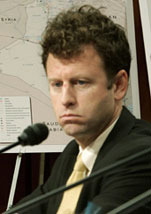Michael O'Hanlon
Born
The United States
Genre
More books by Michael O'Hanlon…
“Military analysis is not an exact science. To return to the wisdom of Sun Tzu, and paraphrase the great Chinese political philosopher, it is at least as close to art. But many logical methods offer insight into military problems-even if solutions to those problems ultimately require the use of judgement and of broader political and strategic considerations as well. Military affairs may not be as amenable to quantification and formal methodological treatment as economics, for example. However, even if our main goal in analysis is generally to illuminate choices, bound problems, and rule out bad options - rather than arrive unambiguously at clear policy choices-the discipline of military analysis has a great deal to offer. Moreover, simple back-of-the envelope methodologies often provide substantial insight without requiring the churning of giant computer models or access to the classified data of official Pentagon studies, allowing generalities and outsiders to play important roles in defense analytical debates.
We have seen all too often (in the broad course of history as well as in modern times) what happens when we make key defense policy decisions based solely on instinct, ideology, and impression. To avoid cavalier, careless, and agenda-driven decision-making, we therefore need to study the science of war as well-even as we also remember the cautions of Clausewitz and avoid hubris in our predictions about how any war or other major military endeavor will ultimately unfold.”
―
We have seen all too often (in the broad course of history as well as in modern times) what happens when we make key defense policy decisions based solely on instinct, ideology, and impression. To avoid cavalier, careless, and agenda-driven decision-making, we therefore need to study the science of war as well-even as we also remember the cautions of Clausewitz and avoid hubris in our predictions about how any war or other major military endeavor will ultimately unfold.”
―
“It is important not to latch onto some strategic fad to justify radical cuts in the U.S. Army or Marine Corps. For two decades, since Operation Desert Storm, some have favored “stand-off” warfare, featuring long-range strike from planes and ships as the American military’s main approach to future combat. But it is not possible to address many of the world’s key security challenges that way including scenarios in places like Korea and South Asia, discussed further below, that could in fact imperil American security. In the 1990s, advocates of military revolution often argued for such an approach to war, but the subsequent decade proved that for all the progress in sensors and munitions and other military capabilities, the United States still needed forces on the ground to deal with complex insurgencies and other threats.
A military emphasis on stand-off warfare is some- times linked with a broader grand strategy of “offshore balancing” by which the distant United States would step in with limited amounts of power to shape overseas events, particularly in Eurasia, rather than getting involved directly with its own soldiers and Marines. But offshore balancing is too clever by half. In fact, overseas developments are not so easily nudged in favorable directions through modest outside interventions. One of the reasons is that off- shore balancing can suggest, in the minds of friends and foes alike, a lack of real American commitment. That can embolden adversaries. It can also worry allies to the point where, among other things, they may feel obliged to build up their own nuclear arsenals as the likes of South Korea, Japan, Taiwan, Turkey, Egypt, and Saudi Arabia might well do absent strong security ties with America. Put bluntly, offshore balancing greatly exaggerates American power by assuming that belated and limited uses of U.S. force can swing overseas events in acceptable directions.”
―
A military emphasis on stand-off warfare is some- times linked with a broader grand strategy of “offshore balancing” by which the distant United States would step in with limited amounts of power to shape overseas events, particularly in Eurasia, rather than getting involved directly with its own soldiers and Marines. But offshore balancing is too clever by half. In fact, overseas developments are not so easily nudged in favorable directions through modest outside interventions. One of the reasons is that off- shore balancing can suggest, in the minds of friends and foes alike, a lack of real American commitment. That can embolden adversaries. It can also worry allies to the point where, among other things, they may feel obliged to build up their own nuclear arsenals as the likes of South Korea, Japan, Taiwan, Turkey, Egypt, and Saudi Arabia might well do absent strong security ties with America. Put bluntly, offshore balancing greatly exaggerates American power by assuming that belated and limited uses of U.S. force can swing overseas events in acceptable directions.”
―
Topics Mentioning This Author
| topics | posts | views | last activity | |
|---|---|---|---|---|
| Goodreads Librari...: Clean Up III | 1036 | 717 | Jun 26, 2021 04:52PM |
Is this you? Let us know. If not, help out and invite Michael to Goodreads.
























